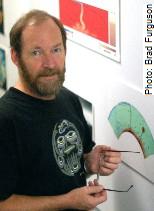 “Tiny
robots may fight terrorism, disease and pollution,” said the headline. Oh
really? And what about tiny robots being used by terrorists to cause disease,
then escaping and polluting the Earth? Are those also possibilities?
“Tiny
robots may fight terrorism, disease and pollution,” said the headline. Oh
really? And what about tiny robots being used by terrorists to cause disease,
then escaping and polluting the Earth? Are those also possibilities?
|
Viewpoint-23 December 2003 |
here’s too much haste and spin and too little mature reflection on the consequences and desirability of what we scientists study, says Geoff Davies.*

I am increasingly impatient with the hype used to promote new technologies. Hype is, by definition, blatantly self-serving, but this techno-hype also speaks to deeper confusions in our troubled society.
Problems like hunger, terrorism, disease and pollution cannot be resolved by technology. Genetic engineering, we are told, will revolutionise agriculture and is desperately needed to feed the world’s growing population. But there is only so much biomass, and already we divert about half of land-surface photosynthetic production to human uses. This means we are already deeply disturbing the global ecological system.
I have recently heard biotechnologists claiming, in the land of feral rabbits and cane toads, that the consequences of the spread of genetically modified traits into the environment are calculable and the risks are manageable. But living organisms and ecosystems are complex self-organising systems and their behaviour is intrinsically unpredictable in detail.
The chances of a dangerous escape may seem to be low, but we can’t hope to anticipate all possible problems and the consequences are potentially so catastrophic that the risk should not be taken. Certainly it should not be inflicted on an ill-informed world for base commercial and political gain.
Promoters of the human genome project insist they will be able to cure myriad human diseases. But Stuart Kauffman of the Santa Fe Institute has shown that gene switches cause genetic expression also to comprise a self-organising complex system. This means the detailed effect of altering particular genes is not predictable†.
Some researchers are trying to stop ageing, even death, but these are fundamental to our multicellular biology, evidently programmed from the beginning, half a billion years ago, as an essential complement to sexual reproduction. Meddling with mechanisms so central to our being in order to have a few people survive indefinitely in an overcrowded world takes my prize for stupidity in the face of the blindingly obvious.
Of course, no-one wants to die, but our Western culture is in deep denial of death, whereas other cultures embrace it as part of the essential cycle of birth, death and renewal. In such cultures an embracing of our own death is seen as part of everyone’s maturing and gaining of wisdom. Our own culture’s problem is in our unrealistic values and our immaturity, not in our lack of biotechnology.
We have the means already for every human being to live a materially sufficient life. The reason it’s not happening is not technological, it’s in the way we organise ourselves. If we want to end poverty and hunger we need to attend to our economic, social and political systems.
I doubt the nanotechnologists are really doing their research because they want to fight terrorism, disease and pollution. They just say those things to get more funding. Rather, they do their work because they are excited by the challenge.
I don’t think we can afford any more to do things just because they’re there to be done. We scientists have to assume responsibility for our actions and their consequences. We have to choose on the basis of healthy, mature values, recognising that the role of technology is limited, and not infrequently counter-productive.
*A
geophysicist, Dr. Geoff Davies is Senior Fellow in the Research School of Earth
Sciences at the Australian National University, where he studies how convection
in the Earth’s mantle drives plate tectonics and continental drift.
He is author of the forthcoming Economia: New economic
systems to empower people and support the living world (ABC Books, 2004).
![]()
conScience
is a column for Australians to express forthright views on national issues.
Views expressed are those of the author.
†
Refer Mitchell Waldrop’s Complexity, Simon and Schuster,
1993.